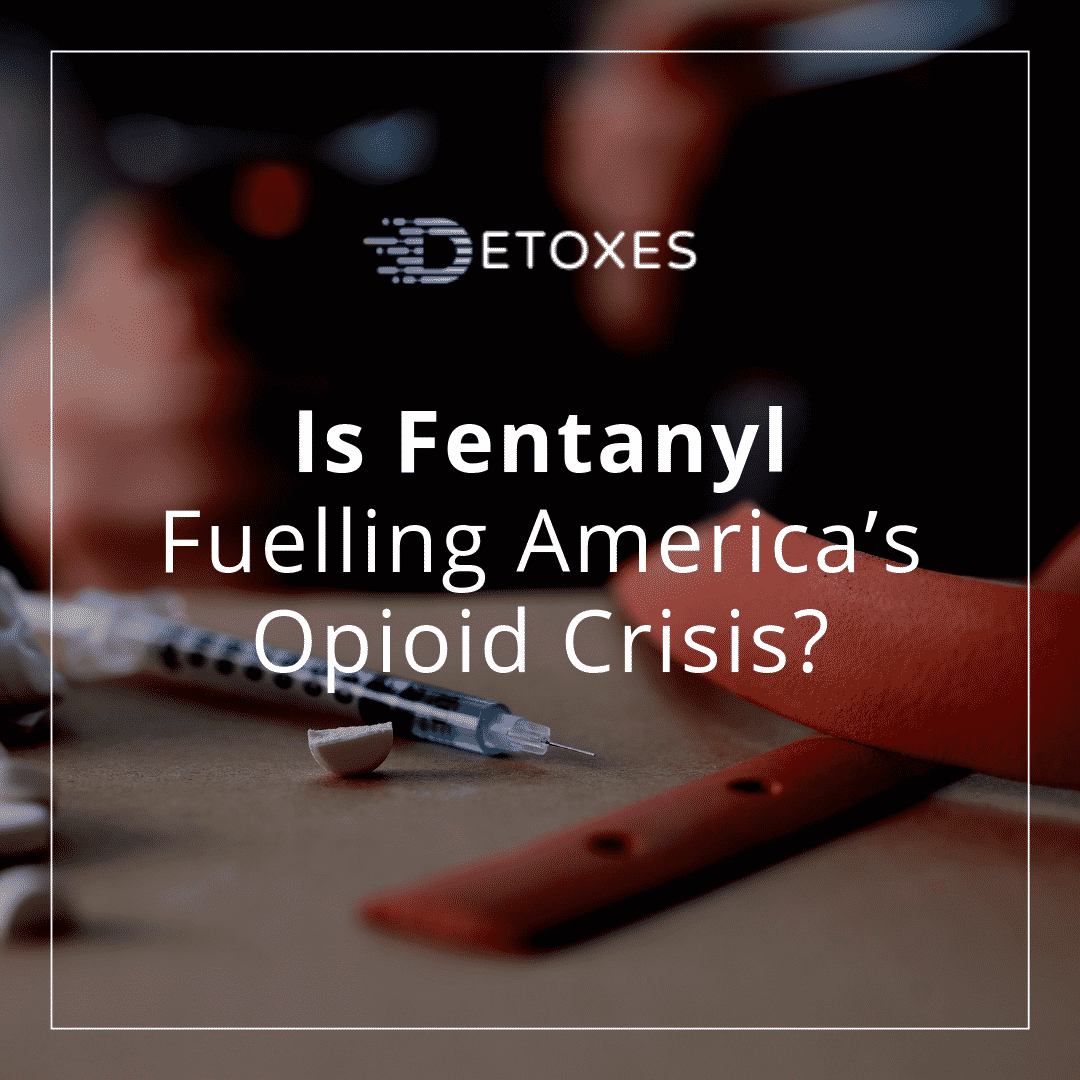Opioid Crisis in America: Is it Fuelled by Fentanyl?
Article Contents
America’s opioid crisis is the unwanted gift that keeps on giving. With newer synthetic versions of typical street drugs flooding communities, availability has soared and the opioid crisis has worsened. One such offender is fentanyl, a synthetic opioid and pain reliever.
A close cousin of heroin, fentanyl is extremely potent. According to the Centers for Disease Control and Prevention: it is between 50-100 times more potent than morphine2. Fentanyl is an extremely deadly drug
The United States has seen an unprecedented increase in the amount of synthetic opioid related deaths, with a 73% increase from 2014 to 2015. These deaths increased a further 47% from 2016 to 20172. How does fentanyl fit in with this clear opioid crisis?
The drug has flooded the marketplace, and the sharp rise in fentanyl-related deaths are likely due to increased availability of illegally-made fentanyl rather than prescribed fentanyl2.
Fentanyl Composition
Fentanyl has been used as an anesthetic supplementary agent with the benefit of strong analgesic properties. It is often used to prevent pain after surgery, as well as in the treatment of persistent, severe pain4.
Administered in a variety of ways such as via skin patches, injections or even orally through ‘lollipops’, fentanyl acts on opioid receptors in the brain.
However, the difference in strength between heroin and fentanyl lies in their molecular structures. Fentanyl simply reaches the brain faster than morphine, and crosses between plasma and brain more quickly5.
Fentanyl and the Opioid Crisis
The strength of fentanyl makes it extremely popular and, therefore, profitable for dealers. As Phillips, Ford & Bonnie explain, an economic incentive exists for dealers and traffickers in order to ‘extend’ heroin’s euphoria with fentanyl, or to simply sell fentanyl on its own7.
This means that dealers may ‘cut’ heroin with fentanyl, worsening the opioid crisis. Sadly, users may not be aware of the fact that their heroin has been cut with a stronger, more potent drug. Overdose becomes much more likelier in this instance. Street purchases of fentanyl have also been reported to be sold as pills made to look like Xanax, while these pills actually contain potent fentanyl6.
The dichotomy is that, while many are completely unaware of what it is they are purchasing, not everyone is quite so naïve. Some users actually do seek fentanyl, due to its heightened potency and as part of the way addiction manifests itself into chasing that next (often unattainable) high. Once addicted, people may experience symptoms of fentanyl withdrawal if they suddenly stop using the drug.
Fentanyl Overdose and the Opioid Crisis
As mentioned earlier, overdose deaths secondary to synthetic opioids including fentanyl are skyrocketing, further exacerbating the opioid crisis.
The problem is that just a few hundred micrograms is enough to trigger a euphoric sensation tantamount to the physical and mental effects of heroin. This means the line between euphoria and fatal overdose is alarmingly flimsy. For example, an amount of fentanyl the size of two grains of salt can easily kill an average-sized adult male1.
A person overdosing on fentanyl may present with the following overdose signs and symptoms3:
- Pinpoint pupils
- Confusion
- Nausea and vomiting
- Loss of consciousness
- Profoundly slowed heart beat
- Dangerously low blood pressure
- Slowed breathing or cessation of breathing
- Convulsions or seizures
These signs may be life-threatening, rendering a patient lifeless or in a coma. If you notice any of these signs and symptoms in someone you suspect has ingested fentanyl, seek immediate medical help.
Getting treatment
If you suspect an overdose may have occurred, it is important to get emergency medical assistance immediately. Fentanyl is an opioid, therefore the opioid-antagonist called naloxone (known by its trade name, Narcan) is the medical antidote of choice1. It has varying degrees of efficacy in fentanyl overdoses; it is dose and duration-dependent.
In the long term, treatment at a rehabilitation center is the gold-standard of care. However, opioid dependency is complex with a high relapse rate. Before choosing a rehab, find out if they are equipped to treat someone with fentanyl addiction. For example, a great way to begin your recovery is at a fentanyl detox program. Also, please read our extensive articles regarding opioids and heroin.
References
- Canadian Centre for Occupational Health and Safety. Opioids (including Fentanyl) – Precautions for first responders. (2018). Retrieved March 12, 2019 from https://www.ccohs.ca/oshanswers/hsprograms/fentanyl.html
- Centers for Disease Control and Prevention. (2018). Fentanyl. Retrieved March 12, 2019 from https://www.cdc.gov/drugoverdose/opioids/fentanyl.html
- Fareed, A., Stout, S., Casarella, J., Vayalapalli, S., Cox, J., & Drexler, K. (2011). Illicit opioid intoxication: diagnosis and treatment. Substance Abuse, 5, 17-25
- Kuczyńska, K., Grzonkowski, P., Kacprzak, L., & Zawilska, J.B. (2018). Abuse of fentanyl: An emerging problem to face. Forensic Sci Int, 289:207-214.
- Lötsch, Walter, Parnham, Oertel, & Geisslinger, 2013, Pharmacokinetics of non-intravenous formulations of fentanyl. Retrieved March 12, 2019 from https://www.ncbi.nlm.nih.gov/pubmed/23100195
- NYC Health. (2017). Health Department warns New Yorkers about cocaine laced with fentanyl; occasional users at high risk of overdose. Retrieved March 12, 2019 from https://www1.nyc.gov/site/doh/about/press/pr2017/pr043-17.page
- Phillips, J.K., Ford, M.A., Bonnie, R.J. (2017). Pain Management and the Opioid Epidemic: Balancing Societal and Individual Benefits and Risks of Prescription Opioid Use. Washington (DC): National Academies Press (US). Retrieved March 12, 2019 from https://www.ncbi.nlm.nih.gov/books/NBK458660/, doi: 10.17226/24781




